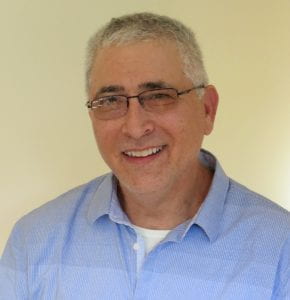UC Santa Cruz Professor Jonathan Levitow teaches Yiddish language classes, as well as various literature classes at UC Santa Cruz. Originally from the San Fernando Valley, which he called “a fine place to grow up, but one of the most blah suburbs of the whole world,” Levitow then went on to attend Stanford University where he received his Bachelors in English literature, and then Princeton University for his Masters and Ph.D. in English. These schools were “challenging.” “Princeton in particular was difficult, I was just glad to survive it—it was cold, I had never been in winter with snow at that point, and had never ridden on commuter trains—things like that were completely new to me.” On top of these new challenges, he elaborates, “I was mocked for having a ‘Valley’ accent and was really unacquainted with East Coast people.” Despite the challenges and pressures that came with attending such prestigious universities, Professor Levitow fondly recalls “really just learning so much.”
Before attending university, Jonathan Levitow grew up in a “mixed Jewish family”. “Bubbe and Zayde and my father all spoke Yiddish, but my mother and her family had come to the U.S. a generation earlier from Grodno, Poland, and were not Yiddish speakers. They very much thought ‘let’s be American.’” The clash in varying Jewish identities he says was “complicated.” “We didn’t always agree with each other but we didn’t fight,” Levitow explains. The culture of his father’s family, from Ostroleka, Poland, was rather secular: “it was more of a Yiddish thing, for most [Yiddish speakers], Yiddish was what they were—they were Yiddish-speaking people and that was enough.” In other words, religion was not the determining factor in claiming Jewish Identity. “As children we didn’t really learn Yiddish or speak it, but I picked up a few words and phrases.” It was not until “after the passing of my father, Bubbe, and Zayde that I began really learning Yiddish. I didn’t want to do anything with it, but I had to know it—someone had to know this language. Bubbe gave me a dictionary—this is the dictionary that everyone uses now in Yiddish class. It has an inscription from her that reads: I hope someday you will use this. Yiddish was important to her. Some immigrants didn’t find so much pride in their culture like that.”
In his journey learning Yiddish, professor Levitow was able to attend many programs specializing in Yiddish instruction in New York and Israel. “These programs have been increasing, they didn’t have such things when I was in my ‘20s. And the education I received was from some of the best teachers in the country.” He elaborates, “Yiddish has such an interesting and fun way to connect with Jewish identity that students seem to really enjoy—I mean there are so many ways to connect—but Yiddish is just such a fun and happy language with such an interesting history.”

